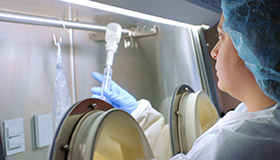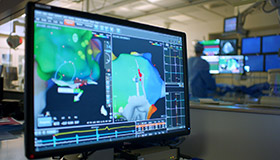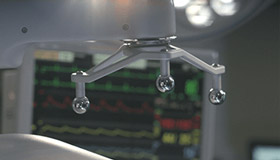Rapid Testing and Treatment Puts Breast Cancer Patients in Good Hands
From worry to milestones in 3 days
AHN doctors treat cancer using guidelines from the National Comprehensive Cancer Network (NCCN). AHN sets itself apart by providing answers — and a multidisciplinary care plan — within three days of diagnosis for most patients.
MaryJo experienced that patient focus when her mammogram at AHN’s Breast Care Center showed a suspicious lump in early October 2017. She chose to have a biopsy the same day.
“They called the next day to tell me it was cancerous, and they already had me booked to see the breast surgeon,” MaryJo said. The breast surgeon, in turn, had arranged an immediate appointment with Christie Hilton, DO, the breast oncologist (cancer specialist) who would guide most of MaryJo’s treatment.
The key: Solid teamwork among doctors and patients
MaryJo’s rapid care wasn’t unusual at AHN, said Dr. Hilton. “For every patient, we try to minimize the wait between getting the pathology report and having a treatment plan in place. Sitting and waiting for a plan can be very difficult, and we’re attuned to that.”
MaryJo’s plastic and reconstructive surgeon, Daniel Murariu, MD, MPH, agrees.
“Patients usually undergo a mastectomy within a few weeks of when I first see them. Our turnaround time is much faster than the national average. That is the result of having a team that communicates efficiently,” he added.
The patient is at the heart of the care team. Once they understand their options, patients choose their care pathway.
Genetic analysis determines treatment approach
Genetic testing revealed that MaryJo is a carrier of the BRCA1 gene, which has implications for her cancer risk and that of her family. Genetic counselors helped educate MaryJo and her family about their specific cancer risks and guidelines for early screening. They also educated and discussed strategies for cancer risk reduction. Read more about genetic testing and cancer support services.
The tumor was a grade 3 triple-negative breast cancer that had not yet spread to the lymph nodes. Triple-negative tumors don’t respond to hormonal therapies. The BRCA1 gene means MaryJo inherited a higher likelihood of developing breast and ovarian cancer. And grade 3 cancer cells are aggressive and likely to grow very fast. Learn more about breast cancer grades.
MaryJo decided she wanted to be equally aggressive with treatment. “It wasn’t in my lymph nodes, so I wasn’t giving it an extra week to grow into my lymph nodes,” she said.
Attacking the tumor with targeted chemotherapy
The AHN Cancer Institute tumor board considered all this information when it reviewed MaryJo’s case to plan her care. The tumor board is a meeting of cancer experts. It includes surgeons, radiologists, medical oncologists, and a plastic surgeon for breast reconstruction.
Just 18 days after her diagnosis, MaryJo had completed her imaging, had a port placed to deliver chemotherapy drugs and started treatment. Her intensive, six-month chemo regimen attacked cancer cells with targeted medications. The goal was to shrink the tumor so surgery could remove it completely.
“I got started on chemo much quicker than anyone else I have met with a breast cancer diagnosis,” she explained. “Dr. Hilton watched me very closely throughout treatment. Over time, we felt the tumor shrink until we could not feel it anymore.”
Timing surgery for best response
The treatment was successful — chemotherapy destroyed the tumor. Then MaryJo had surgery, with the best possible outcome: The post-surgery pathology (laboratory) report showed she was cancer-free.
MaryJo’s team guided her through a prophylactic oophorectomy (preventive removal of the ovaries) to avoid ovarian cancer that can develop in women with the BRCA1 gene. She will continue to follow up with Dr. Hilton every few months. And she’s stayed in touch with Patty Kelly, her “phenomenal” breast care nurse navigator from AHN. Ms. Kelly recently connected MaryJo with the next milestone of her care — joining a breast cancer survivorship group.
Keeping the next generation safer
AHN provides a full circle of care for women with a gene linked to breast cancer. That care will benefit MaryJo’s teenage daughter and other young women like her. The network’s high-risk breast clinic follows women who carry the BRCA1 gene or who have a first-degree relative who has had cancer.
The high-risk clinic works to catch signs of cancer early and make decisions about prevention. Women who are affected can make choices about their health.
In the meantime, MaryJo’s daughter, Lexi, volunteers for AHN oncology and is considering oncology as a future career. She aims to pass on to others the difference that the people of AHN made in her mom’s life.
“Be proactive, not reactive,” MaryJo said. “If you know about it, you can do something about it.”
Contact us
Request an appointment with one of our experts or get more information about the Allegheny Health Network Cancer Institute.





